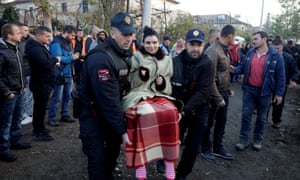At least 14 people have died and 600 people have been injured after a powerful earthquake hit Albania in the early hours of Tuesday, causing damage along the country’s Adriatic coastline and in the capital, Tirana. Several buildings collapsed, burying residents in the rubble.
The 6.4-magnitude quake struck shortly before 4am local time (0300 GMT), the US Geological Survey said, and was the second powerful tremor to hit the region in two months. It was centred 19 miles west of Tirana, at a shallow depth of 12.4 miles. Scores of aftershocks included three with preliminary magnitudes of between 5.1 and 5.4.
Endri Fuga, the Albanian government’s director of communications, wrote on Twitter shortly before midday local time that 28 people have been pulled alive from the rubble and 600 people have been given medical assistance. “Emergency teams arriving from Kosovo, Italy, Greece and other neighbours. Rescuers being helped by volunteers in an unprecedented show of solidarity,” he wrote.

The Albanian president, Ilir Meta, said the situation in the town of Thumanë, closest to the epicentre, was very dramatic. “All efforts are being made to take the people out of the ruins,” he said, and called on the cabinet to request international assistance. Neighbouring countries, the European Union and the United States have all offered immediate support.
An unidentified man, with a wound dressing on his right cheek, told News24 TV his daughter and niece were among those trapped in a collapsed apartment building in the coastal city of Durrës.
“I talked with my daughter and niece on the phone. They said they are well and are waiting for the rescue. I could not talk to my wife. There are other families, but I could not talk to them,” the man said.
Schools in the country have been closed for the day, and flights from Tirana’s airport suspended because of damage to the building.
The early reports of fatalities included two women who were found in the rubble of an apartment building in Thumanë, and a man who died in the town of Kurbin after jumping out of a building.
Three people died in the western port city of Durrës, 20 miles from Tirana, including two whose bodies were taken out of a collapsed building. Emergency workers told local media one of those killed in Durrës was an elderly woman who had managed to save her grandson by shielding him with her body.
Another victim died in an accident on a road cut off by debris in north-western Lezhë.

All government agencies are on alert and “intensively working to save lives at the fatal spots in Durrës and Thumanë”, the prime minister, Edi Rama, said. “It is a dramatic moment where we should preserve calm, stay alongside each other to cope with this shock,” he wrote on his Facebook page.
Unverified video footage posted on social media showed what appeared to be a collapsed building in Durrës. Other footage showed buildings with large cracks and fallen masonry, including one apartment with most of a bedroom wall missing.
Two government spokesmen told Reuters the greatest damage to buildings was in Durrës and a few people had been taken to hospital in Tirana.
A series of aftershocks were felt throughout the region on Tuesday morning. In nearby Bosnia, another quake with a preliminary magnitude of 5.4 struck south-east of the capital and rattled Sarajevo. There were no immediate reports of casualties or damage. The quake was felt as far afield as southern Italy and northern Greece, though Greece’s leading seismologist Efthymios Lekkas said it had not impacted or activated its own seismic faultlines.
Countries across the region offered assistance and support, with Kosovo, Montenegro and Serbia all pledging to send assistance and rescue teams. Greece said it would immediately deploy disaster response teams to the neighbouring country. The prime minister, Kyriakos Mitsotakis, ordered the assistance after speaking to Rama early on Tuesday.

The Greek foreign minister, Nikos Dendias, also tweeted that he would head straight to Tirana from Skopje, the North Macedonian capital, which he is currently visiting, saying he had spoken to Athens’s civil protection minister to discuss emergency aid.
Albania and the wider western Balkan region experiences regular seismic activity. A 5.6-earthquake shook the country on 21 September, damaging about 500 houses but causing no fatalities. In 1963, a powerful quake struck Skopje, the capital of nearby North Macedonia, destroying most of the city and killing more than 1,000 people.








